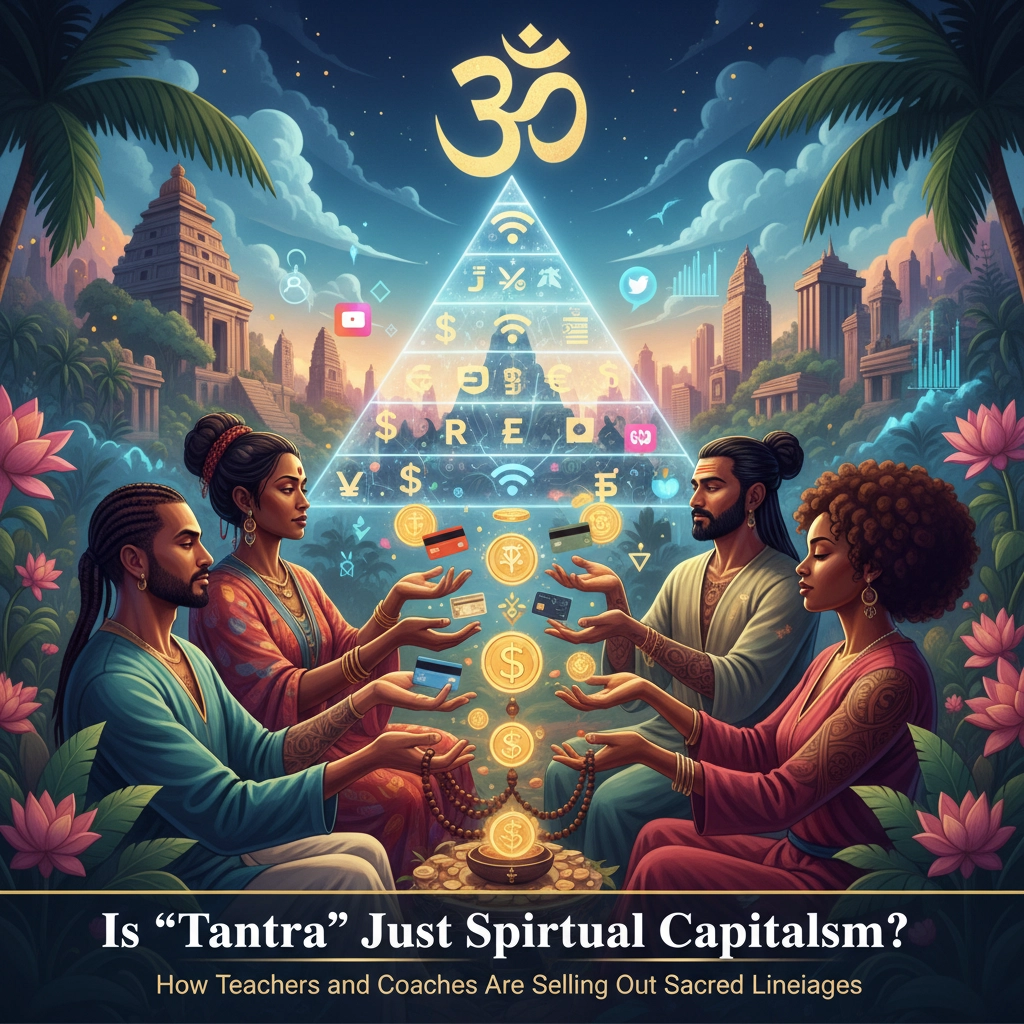Let's cut through the bullshit. Walk into any wellness expo, scroll through Instagram, or Google "tantra courses" and you'll be hit with a tsunami of $3,000 retreats, "certified tantric coaches" with 200-hour trainings, and promises of mind-blowing orgasms wrapped in spiritual jargon. Welcome to the wild west of spiritual capitalism, where ancient wisdom gets repackaged as premium lifestyle products.
The uncomfortable truth? Much of what's being sold as "tantra" today has about as much connection to authentic lineages as McDonald's has to fine dining. But before we torch the whole scene, let's dig deeper into what's really happening: and how to navigate this mess without losing your money or your soul.
What Is Spiritual Capitalism?
Spiritual capitalism is the commodification of sacred practices, turning ancient wisdom into marketable products. It's when spiritual concepts get sanitized, simplified, and sold to the highest bidder. Think "Zen" deodorant, corporate mindfulness seminars, and yes: weekend tantra workshops promising instant enlightenment for the price of a used car.
The hallmarks are obvious once you know what to look for: high price tags, quick certifications, marketing that focuses on personal benefits over spiritual growth, and teachers who seem more interested in building their brand than preserving lineage integrity.
In the tantra world, this manifests as teachers claiming ancient authority while offering practices they invented last Tuesday, retreat centers charging luxury hotel prices for basic accommodations, and certification programs that churn out "tantric coaches" faster than Starbucks trains baristas.

The Tantra Gold Rush: How We Got Here
The Western tantra scene exploded in the 1960s and 70s, coinciding with the sexual revolution and spiritual seeking. Legitimate teachers like those who studied with Osho brought authentic practices to the West, but the lack of traditional gatekeeping mechanisms created a perfect storm for exploitation.
Here's where it gets messy: unlike traditional ashram systems where students spent years in disciplined study, Western spiritual consumers want results now. Enter the entrepreneurs who saw an opportunity to give people what they wanted: spiritual practices without the discipline, ancient wisdom without the commitment, and transformation without the work.
The result? A marketplace flooded with pseudo-tantric offerings that range from mildly helpful to potentially harmful, all while the real lineages struggle to maintain authenticity in an increasingly commercialized landscape.
The Price Tag of Sacred: Examples of Spiritual Capitalism in Action
The Certification Mill
Want to become a "certified tantric coach"? That'll be $5,000 for a 10-day intensive. Never mind that traditional tantric training took decades of study with qualified gurus. These programs promise to teach you everything you need to know about 5,000-year-old practices in less time than it takes to learn Excel.
Compare this to authentic lineage traditions where students might spend years just learning to properly invoke a single deity, or where sexual practices weren't even introduced until after years of purification and preparation work.
The Retreat Racket
Luxury tantra retreats charging $4,000+ for a weekend in Tulum, complete with Instagram-worthy backdrops and influencer teachers whose main qualification seems to be their follower count. These events often promise "life-changing transformation" while delivering generic workshops that could be found in any self-help seminar.
Meanwhile, authentic tantric ashrams in India operate on donation basis, focusing on spiritual development rather than providing a luxury experience for wealthy Westerners.
The Product Pipeline
Crystals, yoni eggs, special oils, tantric jewelry: the accessories market around modern tantra is massive. While some traditional tools do exist in authentic practices, the current marketplace pushes consumption as spiritual practice. Buy this, wear that, own these special items and you'll unlock tantric secrets.
Traditional tantra emphasized internal work over external tools. The proliferation of "must-have" tantric products represents a fundamental misunderstanding of the practices' inner-directed nature.

The Real Cost: What We're Losing
Lineage Dilution
When everyone's a guru and every practice gets reduced to weekend workshop format, authentic transmission suffers. Traditional tantric knowledge, carefully preserved through generations of disciplined practitioners, gets lost in a sea of made-up techniques and borrowed terminology.
Real tantric masters often won't even accept students without years of preparation. The current scene of instant teachers and immediate gratification seekers creates a gap that's almost impossible to bridge.
Cultural Appropriation
Let's be honest: most Western tantra teachers are white, middle-class entrepreneurs selling practices from cultures they've never lived in to audiences who know nothing about the source traditions. While cultural exchange isn't inherently problematic, the current dynamic often involves taking the sexy bits while ignoring the cultural context, ethical frameworks, and disciplined lifestyle that traditionally accompanied these practices.
Student Exploitation
High prices create accessibility barriers that contradict tantra's original democratizing impulse. When spiritual practices become luxury goods, they exclude the very people who might benefit most. Plus, the emphasis on quick results and dramatic experiences can lead students to bypass necessary foundation work, potentially causing psychological or spiritual harm.
Spotting the Difference: Authentic vs. Commercialized
Red Flags of Spiritual Capitalism
-
Price as primary barrier: If the main thing keeping you from learning is money rather than readiness or commitment, you're looking at spiritual capitalism.
-
Quick certifications: Any program claiming to teach ancient wisdom in days or weeks should be viewed with suspicion.
-
Marketing over substance: Teachers who spend more time on Instagram than in practice, whose websites focus on results rather than process.
-
No lineage transparency: Authentic teachers can trace their training back through recognizable traditions and will freely discuss their teachers and sources.
-
Promises of instant transformation: Real spiritual work takes time. Anyone promising immediate results is probably selling something.
Signs of Authenticity
-
Accessible pricing or sliding scale: Authentic teachers often prioritize sharing the teachings over maximizing profit.
-
Emphasis on ethics and preparation: Traditional tantra includes extensive ethical training and personal development work before advanced practices.
-
Clear lineage connections: Legitimate teachers can document their training and often encourage students to verify their credentials.
-
Long-term commitment: Authentic practices require ongoing relationship between teacher and student, not one-off workshops.
-
Cultural respect: Teachers who acknowledge the source cultures and demonstrate genuine understanding of the broader spiritual context.

Finding Your Way Through the Maze
Do Your Research
Before investing time or money, investigate teachers' backgrounds thoroughly. Look for clear lineage connections, years of study with recognized masters, and transparency about their training. Check references and talk to long-term students if possible.
Start Simple
Authentic tantric practices often begin with basic meditation, ethical development, and study of foundational texts. Be suspicious of any teaching that jumps straight to advanced or sexual practices without establishing these fundamentals.
Trust Your Gut
If something feels more like a sales pitch than a spiritual teaching, it probably is. Authentic teachers focus on your readiness and development rather than your wallet.
Seek Community
Look for practice communities that emphasize mutual support and long-term growth rather than consumption of experiences. Real spiritual communities develop slowly and focus on collective development rather than individual achievement.
Consider the Source
If you're serious about authentic tantra, consider studying with teachers who have direct connections to traditional lineages in India or Tibet, or who can demonstrate decades of dedicated practice and study.
The Bottom Line
The commodification of tantra reflects broader patterns in how capitalism co-opts spiritual wisdom. While not every modern teacher or practice is exploitative, the current spiritual marketplace creates powerful incentives for dilution, appropriation, and exploitation.
The solution isn't to avoid all modern teachers or reject any practice that costs money. Instead, we need discernment. We need to distinguish between teachers sharing authentic wisdom and entrepreneurs selling spiritual experiences. We need to recognize that real transformation requires commitment, time, and work: not just the right workshop or certification.
Most importantly, we need to remember that tantra, at its core, is about liberation: not consumption. The authentic path leads toward freedom from the very market forces that are trying to sell it back to us.
The sacred can't be bought, but it can be earned through dedication, humility, and genuine practice. The question is: are you ready to do the work, or are you just looking to buy the experience?



